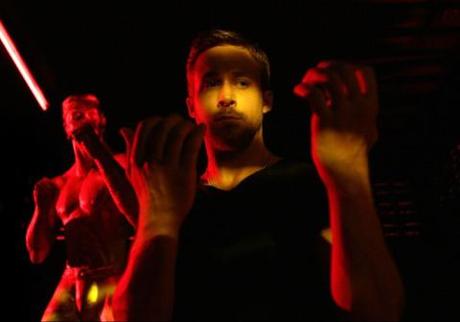
by Steve Habrat
In 2011, Danish director Nicholas Winding Refn found mainstream success with his blazing art-house thriller Drive, a film that took me by complete surprise. What I figured would be just another throwaway action movie with growling muscle cars turned out to be an 80s existential gut-punch throwback that wasn’t easy to shake off. Needless to say, it definitely had me eagerly anticipating what Refn would deliver next. Two years later, Refn returns with Only God Forgives, a film that couldn’t be a bigger disappointment. Lit like Dario Argento’s Suspiria, sculpted around one of the laziest plots you could imagine, and weird just for the sake of being, well, weird, Only God Forgives reteams Refn with Drive star Ryan Gosling, an ever-welcome talent that was the head-stomping main-attraction of Drive. With a star like Gosling in front of the camera, you’d think that he would be able to bring something substantial to this snoozefest, but its as if he was sleepwalking through the role, quietly trying to make sense of what exactly Refn was trying to achieve here aside from paying tribute to his idol, Alejandro Jodorowsky, which is what he claimed to be doing with Drive. What we’re left with is a senselessly bloody exercise in style without any purpose or direction. Only God Forgives exists simply to be morose collection of empty neon images that are better suited for a music video.
Only God Forgives introduces us to Julian (played by Ryan Gosling), an American drug dealer running a boxing club that is actually a front for a drug operation in Bangkok. One stormy evening, Julian’s erratic brother, Billy (played by Tom Burke), rapes and kills a young prostitute in a seedy hotel room. The Bangkok police quickly discover what Billy has done, but rather than detaining him and taking him to the station, the police call in retried officer Chang (played by Vithaya Pansringarm), a sword-wielding sadist known as the Angel of Vengeance. Chang encourages the girl’s father, Choi Yan Lee (played by Kovit Wattanakul), to do what he wishes to Billy. In a fit of rage, Choi kills and mutilates Billy’s body. Word of Billy’s death soon reaches Julian and his associates, who track down Choi to question him about Billy’s brutal murder. Meanwhile, Julian’s mother, Crystal (played by Kristin Scott Thomas), arrives in Bangkok to claim Billy’s body and get to take control of the situation. After learning that Julian spared Choi’s life, Crystal demands that he take to the neon streets and exact bloody revenge on the men responsible.
Early on, Only God Forgives shows signs of promise with the swirling sense of dread that lingers over the hypnotic red and blue frames. Refn slowly glides his camera down harshly lit hallways aglow with red lighting that suggest that we have stepped into Hell itself. You’ll be on the edge of your seat as Billy, Julian, their associates, and a boxer stand around in a darkened room declaring “it’s time to meet the devil.” The tension and unease tighten when Billy stumbles off to a futuristic whorehouse in the hopes of finding a young fourteen-year-old girl to have his way with, something that is sure to make any viewer sick to their stomach. It all feels so tremendously evil and it’s about as atmospheric as a film can be. Sadly, the sinister mood of the film is quickly overtaken by Refn’s trudging pace, which gives way to frustrating tedium. Every single scene feels unnecessarily drawn out or glaringly hollow as characters sit around in flashing nightclubs or lavish hotel rooms staring off into space or silently plotting their next vicious move. It’s certainly pretty to look at, that I can’t deny, but it seems that Refn is under the impression that these stretches of meditative silence are thought provoking in all their surreal glory. Instead, they become mind-numbingly boring, further hurt by the lack of an entrancing character.

As far as the characters of Only God Forgives are concerned, almost every single one of them is as wretched as they could possibly be. Gosling’s Julian just sits around sulking, watching blank-faced prostitutes pleasure themselves or staring down at his quivering fists like it’s the first time he has ever seen them. He does show a few hints of compassion, which makes him slightly redeemable, but his constant detachment makes his character a major bore. Things really get weird when his sexpot mother, Crystal, shows up to scold him for not gunning down his brother’s killer when he had the chance. Crystal consistently alludes to having sexual relations with both of her sons, the most awkward coming when she discusses Billy and Julian’s, um, manhood with Mai (played by Rhatha Phongam), a prostitute paid to act as Julian’s girlfriend. Then we have Pansringarm’s Chang, a mysterious man who brings his punishing sword down on any man or woman who has committed an atrocious sin. He encourages Choi to murder Billy, only to return to chop off one of Choi’s arms for turning a blind eye to his daughter’s line of work, and he savagely tortures a gangster responsible for ordering a hit that left several citizens and police officers dead. Pansringarm’s eerily calm demeanor is meant to send chills, especially when he nonchalantly brings bloody vengeance down on his victim’s heads with so much as blinking, but Refn doesn’t write any personality into the character. The most interesting thing about him is that he likes to sing karaoke.
Only God Forgives finds Refn also reteaming with Cliff Martinez, the man who composed the chilling score for the masterpiece that is Drive. Only once or twice does Martinez unleash the retro synths that accompanied Drive and he does incorporate a throbbing organ that compliments the hellish blaze of the winding hallways we wander around, but everything else just falls flat by comparison. One of the stronger aspects of Only God Forgives is the way that Refn pays tribute to Jodorowsky, the man behind such midnight movies like Holy Mountain and El Topo. Several symmetrical shots called to mind certain scenes from Holy Mountain and there was even an echo of Kubrick in a few spots, something that was particularly surprising. Overall, while Drive was certainly going to be a tough act for Refn to follow, Only God Forgives is a disastrous follow-up that consistently allows style to mask the fact that there is very little substance. The artistic freedom is certainly refreshing and the ominous mood is undoubtedly effective, but it becomes increasingly clear that Refn is simply stroking his ego, leaving you disappointed that you didn’t just re-watch your copy of Drive. Plus, it’s a bad sign when Ryan Gosling can’t even save your movie.
Grade: D+
Only God Forgives is available on Blu-ray and DVD.
